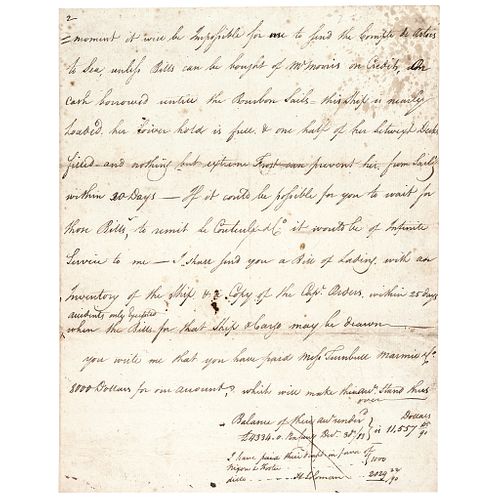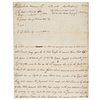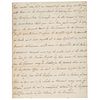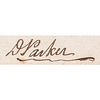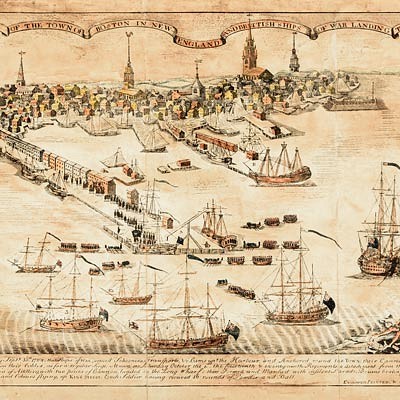c. 1780s Revolutionary War, Autograph Letter Signed by Daniel Parker
Lot 145
Categories
Estimate:
$800 - $1,200
Absentee vs Live bid
Two ways to bid:
- Leave a max absentee bid and the platform will bid on your behalf up to your maximum bid during the live auction.
- Bid live during the auction and your bids will be submitted real-time to the auctioneer.
Bid Increments
| Price | Bid Increment |
|---|---|
| $0 | $10 |
| $200 | $20 |
| $300 | $25 |
| $500 | $50 |
| $1,000 | $100 |
| $2,000 | $200 |
| $3,000 | $250 |
| $5,000 | $500 |
| $10,000 | $1,000 |
| $20,000 | $2,000 |
| $30,000 | $2,500 |
| $50,000 | $5,000 |
| $100,000 | $10,000 |
| $200,000 | $20,000 |
| $300,000 | $25,000 |
| $500,000 | $50,000 |
About Auction
By Early American History Auctions
Mar 20, 2021
Set Reminder
2021-03-20 12:00:00
2021-03-20 12:00:00
America/New_York
Bidsquare
Bidsquare : Autographs-Colonial-Political-Americana
https://www.bidsquare.com/auctions/early-american-history-auctions/autographs-colonial-political-americana-6509
330 Lots of Rare, Historic Autographs, Americana, Civil War Era, George Washington, Abraham Lincoln, Slavery & Black History, Revolutionary War Era, Colonial America, Federal Period, War of 1812, Colonial Currency, Indian Peace Medals & more... Early American History Auctions auctions@earlyamerican.com
330 Lots of Rare, Historic Autographs, Americana, Civil War Era, George Washington, Abraham Lincoln, Slavery & Black History, Revolutionary War Era, Colonial America, Federal Period, War of 1812, Colonial Currency, Indian Peace Medals & more... Early American History Auctions auctions@earlyamerican.com
- Lot Description
American Revolution
"Money is Tight" Financial Letter by Revolutionary War Continental Army Supplier and Financier Daniel Parker
c. 1780s Revolutionary War Period, Autograph Financial Related Letter Signed, "Daniel Parker," mentions Settling of Accounts and Treasurer Mr. (Robert) Morris, Choice Very Fine.
This Revolutionary War period Financial Related Letter is fully written and signed by Daniel Parker. The letter is 2 pages, measuring 13.5" x 8.75" (folded between the pages) being well written in rich brown on fine quality laid period paper. Parker writes that the French frigate "Bourbon" is nearly ready to sail, but without payment from (Continetal Congress Treasurer Robert) Morris, he will need credit... if his credit could be extended it would be greatly appreciated. He then writes about another deal he is in need of money for, to which he was to profit 3,000 pounds if it went perfectly. Parker then writes about another large sum that he is overdue, for supplies for the Troops of South Carolina, where 600 pounds is still due to him. As soon as he gets all caught up with what is owed him, he will immediately settle all his accounts. Signed at the conclusion, "D. Parker." An interesting, historic Revolutionary War era original government contractor letter from a man who was ultimately to become a financial crook and mastermind.
Daniel Parker & Co., a firm that supplied Continental troops with provisions. Parker was a military supply contractor when U.S. Contiental Congress Superintendent of Finance Robert Morris began contracting to supply George Washington's army in 1781.
Parker soon learned the secret of profitable contracting: first, informed speculation in securities based on soldiers' pay claims, and second, providing a company store at which the soldiers could spend those pay claims -- valued, of course, by Parker at the "best" price he could afford to pay. That was often just five to 10 cents on the dollar.
When Washington's Continetal Army was mustered out in 1783, some of its members hadn't been paid for up to two years. Parker agreed to help Washington do so. The catch: The payments were to be made in notes redeemable in rum, food and clothing only at Parker's store.
Getting the Federal government to honor the obligations represented by these securities took seven years, but the deal certainly proved to be worth it for Parker. As these years rolled on, he kept his hand in other business deals, some with politicians, generals and financiers at the highest levels of the new nation.
Ultimately, Parker absconded to Europe with $38,829.41 that Robert Morris had advanced him in cash to help feed the Army. He said he was trying to recover funds from the failed Dutch trading house of De la Lande & Fynje, which had been handling the Dutch loans to the United States... but Parker never returned.
Operating from Europe, Parker employed Andrew Craigie, a leading American merchant, to act as his broker in quietly buying more of the 6% "finals" in America. Parker sold $320,000 worth of them to Dutch financier Pieter Stadnitski. Then the two took in other European financiers as partners and bought all the depreciated finals they could find. Placing them in a Dutch trust, they sold 1,000-florin certificate interests in American securities to European investors. In effect, this was the first mutual fund involving American assets.
Parker lived out his years a wealthy man, ensconced in a palatial chateau in Draveil, France, dallying with his mistress and dabbling in grandiose plans, such as selling torpedoes to Napoleon .
Our Auction Contents:
Black History & Slavery: (Lots 1 - 63)
Abraham Lincoln Related: (Lots 64 - 74)
Historic Autographs: (Lots 75 - 235)
Colonial America: (Lots 236 - 261)
Revolutionary War: (Lots 262 - 304)
George Washington Related: (Lots 305 - 306)
Early American Guns & Weapons: (Lots 307 - 318) - Shipping Info
-
Early American provides in-house worldwide shipping. Please contact us directly if you have questions about your specific shipping requirements.
-
- Buyer's Premium



 EUR
EUR CAD
CAD AUD
AUD GBP
GBP MXN
MXN HKD
HKD CNY
CNY MYR
MYR SEK
SEK SGD
SGD CHF
CHF THB
THB